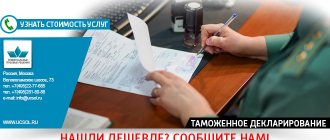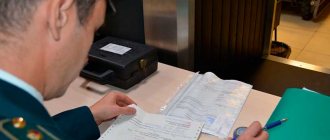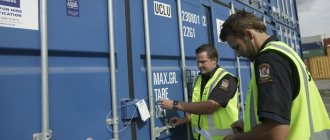Dear passengers! We inform you about the procedure for individuals moving goods for personal use across the customs border of the Customs Union.
Currently, the Russian Federation is a member state of the Customs Union.
The single customs territory of the Customs Union consists of the territories of the republics of Armenia, Belarus, Kazakhstan, Kyrgyzstan and Russia. The limits of the single customs territory of the Customs Union are the customs border of the Customs Union. The movement of goods across the customs border of the Customs Union is regulated by the customs legislation of the Customs Union. The customs legislation of the Customs Union defines the following concepts.
Product
- any movable property moved across the customs border, including storage media, currency of member states of the Customs Union, securities and (or) currency values, traveler's checks, etc.
Goods for personal use
- goods intended for personal, family, household and other needs of individuals not related to business activities, transported across the customs border in accompanied or unaccompanied baggage or in another way.
Indivisible goods for personal use
- goods for personal use, weighing more than 35 kilograms, consisting of one unit or one set of goods, including those transported in disassembled, unassembled, incomplete or unfinished form, provided that the goods have the basic property of an assembled, complete or completed product.
Accompanied baggage
— goods for personal use, including hand luggage, directly transported by an individual crossing the customs border.
Unaccompanied baggage
- goods for personal use belonging to an individual, transferred or transferred to the carrier under an international transportation agreement (transport expedition) for actual movement across the customs border in connection with the entry of this individual into the territory of the Customs Union or his departure from the customs territory of the Customs Union.
When traveling across the customs border of the Customs Union by air, the following are subject to customs declaration (a passenger customs declaration is filled out):
- imported goods, the customs value of which exceeds 10,000 euros in equivalent and (or) the total weight of which exceeds 50 kg;
- imported and exported cash (banknotes, treasury bills, coins, with the exception of coins made of precious metals) and (or) traveler's checks for a total amount exceeding the equivalent of 10,000 US dollars;
- imported and exported monetary instruments (bills of exchange, bank checks, securities);
- cultural values;
- exported state awards of the Russian Federation;
- endangered animals and plants, their parts, as well as products obtained from them;
- weapons and ammunition;
- imported alcoholic beverages in quantities exceeding 3 liters, but not more than 5 liters;
- narcotic drugs and psychotropic substances in the form of medicines for medical reasons in the presence of relevant documents;
- radio-electronic equipment and (or) high-frequency devices for civilian use, including those built-in or included in other goods;
- technical means with encryption functions;
- goods for personal use received as an inheritance, subject to documentary confirmation of the fact of receiving such goods as an inheritance;
- goods for personal use imported in accompanied baggage, if the individual transporting them has unaccompanied baggage;
- other goods determined by the customs legislation of the Customs Union.
ATTENTION! An individual has the right, at his own discretion, to declare in writing goods that are not subject to customs declaration in writing.
The declarant of goods transported across the customs border can be either a person from a member state of the Customs Union or a foreign person.
Customs declaration of goods for personal use of an individual under 16 years of age is carried out by the person accompanying him (one of the parents, adoptive parents, guardian or trustee of this person, and in case of organized departure (entry) of a group of minors - by the leader of the group).
Failure to submit a customs declaration in respect of the above goods is considered as a statement that an individual does not have goods subject to customs declaration. Detection of goods subject to customs declaration during selective customs control entails holding the passenger accountable in accordance with the legislation of a member state of the Customs Union.
Reporting false information in a passenger customs declaration entails liability in accordance with the legislation of a member state of the Customs Union. The submission of a passenger customs declaration must be accompanied by the submission to the customs authority of documents confirming the information stated in it.
Such documents include:
- identity documents (including those of a minor);
- documents confirming the adoption, guardianship or trusteeship of a minor;
- documents confirming the value of the declared goods for personal use;
- transport (shipping) documents;
- documents confirming the right to benefits in the payment of customs duties, including confirming the temporary import (export) by an individual of goods for personal use, as well as confirming the recognition of an individual as a refugee, forced migrant or moving to a permanent place of residence;
- documents confirming compliance with restrictions, except for non-tariff and technical regulation measures;
- documents containing information allowing to identify a vehicle for personal use;
- documents confirming the right to own, use and (or) dispose of a vehicle for personal use;
- other documents and information, the presentation of which is provided in accordance with the customs legislation of the Customs Union.
ATTENTION! In the absence of goods subject to customs declaration, the above documents are presented at the request of a customs official.
The following goods can be imported into the customs territory of the Customs Union with exemption from customs duties:
- the customs value of which does not exceed 10,000 euros in equivalent and (or) the total weight of which does not exceed 50 kg;
- alcoholic drinks and beer no more than 3 liters per individual over 18 years of age;
- tobacco and tobacco products: 200 cigarettes or 50 cigars (cigarillos) or 250 gr. tobacco, or the specified products in an assortment with a total weight of no more than 250 grams, per individual over 18 years of age;
- used goods imported by refugees, internally displaced persons, and migrants;
- received as an inheritance, subject to documentary confirmation of the fact of receiving such goods as an inheritance;
- imported by diplomatic workers, administrative and technical staff of a diplomatic mission or consular office and members of their families;
- imported by individuals sent to work in a foreign state by government bodies, whose period of stay outside the customs territory of the Customs Union was at least 11 months (subject to documentary confirmation);
- imported by individuals who temporarily resided abroad for at least 1 year (subject to documentary confirmation), the customs value of which does not exceed the equivalent of 5,000 euros;
- imported back into the customs territory of the Customs Union in an unchanged condition, subject to confirmation of their export from the territory of the Customs Union;
- cultural values, subject to their classification as such in accordance with the legislation of the member states of the Customs Union;
- urns with ashes (ashes), coffins with bodies (remains) of the dead;
- used goods temporarily imported by foreign legal entities into the customs territory of the Customs Union:
- jewelry (in the quantity necessary for use during the period of temporary stay);
- personal hygiene items (in the quantity necessary for use during the temporary stay);
- photo cameras, video cameras, movie cameras (in the quantity of no more than 1 unit) and accessories for them (in the quantity necessary for use during the period of temporary stay);
- portable film projectors, projectors for viewing slides (in the quantity of no more than 1 unit) and accessories for them (in the quantity necessary for use during the period of temporary stay);
- portable video recorders (no more than 1 unit);
- portable sound recording and reproducing equipment (including voice recorders), DVD players (in the quantity of no more than 1 unit) and accessories for them (in the quantity necessary for use during the period of temporary stay);
- portable record players (in the quantity of no more than 1 unit) and gramophone records (in the quantity necessary for use during the period of temporary stay);
- audio recording media, without recording and with recording (in the quantity necessary for use during the period of temporary stay);
- portable radios, flash players (in the quantity of no more than 1 unit) and accessories for them (in the quantity necessary for use during the period of temporary stay);
- TVs with a screen diagonal size of no more than 42 cm (in quantities of no more than 1 unit);
- portable typewriters (no more than 1 unit);
- binoculars (no more than 1 unit);
- mobile phones (no more than 2 units);
- portable personal computers (laptops) (in the quantity of no more than 1 unit) and accessories for them (in the quantity necessary for use during the period of temporary stay);
- portable musical instruments (in the quantity necessary for use during the period of temporary stay);
- baby strollers (in the quantity necessary for use during the temporary stay);
- child seats attached to car seats (in the quantity necessary for use during a temporary stay);
- wheelchairs for disabled people (in the quantity necessary for use during a temporary stay);
- equipment and accessories for sports, tourism and hunting, balloons (in the quantity necessary for use during the period of temporary stay);
- portable dialyzers and similar medical devices, as well as consumable materials for them (in the quantity necessary for use during the period of temporary stay);
- pets, including those intended for hunting, sports (in the quantity necessary for use during the period of temporary stay).
When importing goods for personal use by individuals into the customs territory of the Customs Union, the following rates of customs duties are applied:
- a flat rate of 30% of the customs value of goods, but not less than 4 euros per 1 kg of weight, in terms of exceeding the value norm of 10,000 euros in equivalent and (or) the weight norm of 50 kg - in the case of importing goods for personal use, the customs value of which exceeds the amount , equivalent to 10,000 euros and (or) the weight of which exceeds 50 kg;
- cumulative customs payment - in case of import of indivisible goods for personal use;
- flat rate of 22 euros per 1 liter - in case of import of ethyl alcohol in quantities from 3 to 5 liters;
- a single rate of 10 euros per 1 liter in terms of exceeding the quantitative norm of 3 liters - in the case of the import of alcoholic beverages and
- beer in quantities from 3 to 5 liters inclusive.
Goods for personal use exported by individuals from the customs territory of the Customs Union are not subject to customs duties, taxes at uniform rates and aggregate customs duties.
ATTENTION! For personal use, an individual cannot export from the territory of the Customs Union:
- fish and seafood (except sturgeon caviar) in quantities of more than 5 kg;
- sturgeon caviar weighing more than 250 grams.
ATTENTION! If goods transported by an individual across the customs border are classified as goods not for personal use, customs operations in relation to such goods (including customs declaration) are carried out in the manner prescribed for participants in foreign economic activity.
The classification of goods transported by an individual across the customs border as goods for personal use is carried out by the customs authority based on:
- statements of an individual about goods being moved (orally or in writing using a passenger customs declaration);
- nature and quantity of goods;
- frequency of crossing of an individual and (or) movement of goods across the customs border
Goods that are not goods for personal use include:
- natural diamonds;
- exported goods for which export customs duties are established;
- central heating boilers;
- mowers (except lawn mowers), hay making machines, etc.;
- tanning salons;
- medical equipment and equipment (except for those necessary along the route or for medical reasons), etc.
ATTENTION! For violation of customs rules, individuals are liable in accordance with the legislation of a member state of the Customs Union.
In case of disagreement with the actions of a customs official, an individual has the right to appeal them in accordance with the legislation of a member state of the Customs Union.
Goods for personal use, the movement of which by individuals across the border of the Russian Federation is permitted with the permission of state authorities:
- weapons, their main parts, ammunition - permission from internal affairs bodies (Main Directorate for Ensuring the Protection of Public Order and Coordination of Interaction with Executive Authorities of the Subjects of the Russian Federation of the Ministry of Internal Affairs of Russia - Moscow, Zhitnaya St., 15);
- cultural property - a permit document for the export of cultural property, issued by the state body exercising control over the circulation of cultural property (Ministry of Culture of Russia - Moscow, M. Gneznikovsky per., 7/6, p. 1,2);
- endangered animals and plants, their parts, as well as products obtained from them - CITES permit issued by Rosprirodnadzor (Moscow, B. Gruzinskaya St., 4/6), Office of Rosprirodnadzor for the Primorsky Territory (690000, Primorsky Territory, Vladivostok, Okeansky Avenue, 31);
- radio-electronic equipment and (or) high-frequency devices for civilian use - permission from Roskomnadzor (Moscow, Kitaygorodsky pr-d, 7, building 2);
- technical means with encryption functions - notification (notification) registered by the Russian FSB Center for Licensing, Certification and Protection of State Secrets (Moscow, B. Lubyanka St., 1/3). The list of registered notifications (notifications) filled out by the product manufacturer or a person authorized by the product manufacturer can be found on the website eurasiancommission.org.
Where should the completed form be submitted?
If customs officers detect smuggling, illegal movement of goods and prohibited items across the border or another offense, then one copy is attached to the criminal or administrative case, and the second is handed or sent to the violator.
If customs officers do not identify any violations or prohibited items or substances, then the completed customs inspection report is stored at the customs office and then (after the established period) is destroyed. The second copy is given to the owner of the cargo (luggage) or the citizen who has undergone personal inspection. He can keep such paper as a keepsake or throw it away.
Forms
The forms of the forms are approved by the Decision of the Customs Union Commission dated May 20, 2010 No. 260 (as amended by the Decision of the Board of the Eurasian Economic Commission dated July 11, 2017 No. 84) and depend on the type of procedure. If goods are checked, the form includes information about the level of background radiation, methods for determining weight, numbers of containers and vehicles, and technical means of control.
When inspecting baggage, a slightly different form is used. It looks simpler, does not contain additional columns, and the customs officer, after indicating the location, describes the results of the examination.
The personal search form has a more complex structure. It includes columns about whether a person needs the services of a translator, or whether he is ready to voluntarily hand over goods hidden from control. In addition, the document contains lines for recording statements of people present and notes about the behavior of the person being examined during the procedure.
An example of filling out a citizen’s customs inspection report
Import and shipment of medicines
Import, as well as international shipment by individuals of medicines, with the exception of narcotic and psychotropic medicines, in accordance with the Agreement of June 18, 2010 “On the procedure for the movement by individuals of goods for personal use across the customs border of the Customs Union and the performance of customs operations related to their release" are carried out without the use of prohibitions and restrictions of a non-economic nature.
The import of medicines for personal use (for non-commercial purposes), not registered in the Russian Federation, does not require a license from the Ministry of Industry and Trade of Russia and permission from Roszdravnadzor.
Individuals have the right to import medications containing narcotic and psychotropic substances for personal use only in limited quantities and for medical reasons, provided they have the appropriate documents. As a rule, this is a prescription or a certificate from a doctor, an extract from the medical history. Such drugs are subject to mandatory customs declaration.
To find out whether your medicine is subject to restrictions and prohibitions when imported into the territory of the Customs Union, you need to study the composition of the drug for the content of narcotic and psychotropic substances. The list of prohibited narcotic and psychotropic substances can be found in paragraph 2.12. A unified list of goods to which prohibitions or restrictions on import or export are applied by member states of the Customs Union within the Eurasian Economic Community in trade with third countries (see the website of the Customs Union Commission https://www.eurasiancommission.org).
The export of medicines from the territory of the Customs Union is not controlled.
Registration procedure
The act is drawn up on the approved form from top to bottom in three stages:
- First, the preamble or header of the document is drawn up. The customs officer writes down his number, date, start time of the procedure, position and full name. The persons present are recorded: witnesses, declarants, owners of goods, specialists (experts). During a personal search of a person, a medical worker and (if necessary) an interpreter are also involved. The customs officer enters your full name on the form. participants, place of work and residence, information about identity documents.
- At the second stage, the customs officer enters data about the place of inspection, the presence (or absence) of the declarant (the owner or his authorized representative) at the event. When examining cargo destined for the recipient, accompanying documents are listed. The weight of goods (luggage) must be reflected.
- Having completed the work, the customs officer indicates the completion time, after which those present sign at the end of the document.
Customs inspection of premises and territories
In accordance with Art. 330 of the EAEU Labor Code, inspection of premises and territories is carried out in order to confirm the presence of goods and vehicles under customs control, including conditionally released ones, in temporary storage warehouses, customs warehouses, in the premises of a duty-free store and other places where goods under customs control may be located , as well as from persons who must have goods under the terms of customs procedures provided for by the Customs Code of the KCC.
Firstly, the objects of inspection are: temporary storage warehouses, customs warehouses, duty-free store premises, as well as other premises and territories where, in accordance with the terms of customs procedures, goods under customs control can be stored (workshops of enterprises where foreign equipment is located , temporarily imported into the customs territory of the Union, warehouses of enterprises where goods imported under the processing procedure in the customs territory are stored, etc.). The legal basis for the inspection may be information about the loss of goods under customs control, their alienation or use in violation of the requirements and conditions established by the EAEU Customs Code. In addition, inspection of premises and territories is possible as a random inspection.
Secondly, the purpose of the inspection is to identify goods imported into the customs territory of the Union in violation of the procedure established by the EAEU Labor Code. The basis for such inspections is information received by the customs authorities. The objects of inspection in such cases are usually checkpoints across the customs border of the Union, customs control zones created along the customs border, as well as premises where wholesale or retail trade of imported goods is carried out.
Information necessary for inspection can be obtained from sources such as messages and statements of individuals and legal entities; media reports; information received from other customs, law enforcement, regulatory and other government bodies; data received from customs, law enforcement services and other competent authorities of foreign states and international organizations.
Customs inspection of premises and territories can be carried out by customs authorities:
1) in places where goods are moved across the customs border of the Union, border zone;
2) from persons engaged in wholesale or retail trade in goods, storing goods in places that are not customs control zones, if there is information about the presence on the premises or territories of these persons of goods imported into the customs territory of the Union and (or) located on it with violation of the procedure provided for by the EAEU Labor Code for verification of such information;
3) from persons in respect of whom an on-site customs inspection is carried out.
Conducting a customs inspection of residential premises is not permitted.
Customs inspection of premises and territories is carried out upon presentation of an order (instruction) and an official identification document of a customs authority official,
The form of the order (instruction) to conduct a customs inspection of premises and territories is determined by the legislation of the member states of the Union. Presentation of these documents is not required during customs inspection of premises and territories of persons in respect of whom an on-site customs inspection is being carried out.
Before starting the inspection of premises and territories, customs officials invite the person whose territory or premises are to be inspected to voluntarily present goods or vehicles, as well as open premises, containers and other places where there may be goods under customs control, including conditionally released or imported into the customs territory of the Union in violation of the procedure established by the customs legislation of the Union.
In case of refusal of access to the territory and premises, customs officials have the right to enter the territory and premises by suppressing resistance and opening locked premises in the presence of two witnesses. The customs authorities notify the prosecutor of all cases of entry into premises with the suppression of resistance and opening of locked premises within 24 hours. Persons who obstruct the access of customs officials to the territory and premises are liable under the legislation of the Union member states.
If the legislation of the member states of the Union provides for a special procedure for access of officials of state bodies to certain objects, then such access is carried out in the manner prescribed by this legislation.
According to the EAEU Customs Code, customs inspection of premises and territories must be carried out within the minimum period required for its implementation, and cannot last more than one working day. However, at the same time, it allows for the establishment of other norms by the legislation of the member states of the Union. So, in Russia, in accordance with Art. 175 of the Federal Law “On Customs Regulation in the Russian Federation”, the period for conducting a customs inspection may last up to three working days in the following cases:
1) refusal of access to premises and territories that are subject to customs inspection, and (or) refusal to voluntarily present goods for customs inspection;
2) if identification of goods requires the implementation of actions in the premises or territory that are subject to customs inspection, and these actions cannot be completed within one working day;
3) if the size of the premises and territory that are subject to inspection exceeds 1000 square meters. m.
Based on the results of the customs inspection of premises and territories, an act is drawn up in the form approved by the decision of the Union Commission, during the inspection or immediately after its completion and signed by all its participants. If for objective reasons this is not possible, detailed rough notes are made during the inspection (sound recording equipment can be used for this purpose) and an act is drawn up and signed as soon as possible. The report is drawn up by the official who conducted the inspection. If representatives of other government bodies are present during the inspection, they also sign the report. It is allowed to transfer copies of the act to them.
It is not allowed to draw up an inspection report of premises and territories by persons other than the officials of the customs authority who conducted the inspection, and to include information not related to the inspection in the inspection report of premises and territories.
The second copy of the customs inspection report on premises and territories is subject to delivery (direction) to the person whose premises or territories were inspected.
Inspection at night is not recommended, except in urgent cases.
Thus, during inspection, customs officials have the right to:
— enter the premises and territory of the inspection, including suppressing resistance and opening locked premises in the manner prescribed by the EAEU Labor Code and the legislation of the Union member states;
— require persons with authority in relation to goods and their representatives to present goods for inspection;
— involve specialists from other bodies, organizations, as well as experts to assist in inspecting premises and territories.
Customs officials are obliged to: carry out inspections within the established time limits; enter into the inspection report of premises and territories information revealed as a result of the inspection, as well as explanations of persons present during the inspection; initiate cases of administrative offenses and criminal cases in accordance with the legislation of the member states of the Union; not cause unlawful damage to goods and premises; ensure compliance with the rights and legitimate interests of persons with authority in relation to the goods, their representatives, as well as the owner or user of the premises and other persons present during the inspection; keep state and other secrets protected by law, and also not disclose information that has become known to them in connection with the inspection; comply with other requirements of Union legislation, international treaties and departmental regulations.
During the inspection, to increase its efficiency, different types of technical means of customs control can be used to identify the necessary information about the goods (their quantity, composition, physical and chemical properties, authenticity). If necessary, during the inspection, measurements are taken, photography, filming, video recording are used, plans, drawings, diagrams are drawn up, and copies of documents are made.
The following persons may be present during the inspection: those with authority in relation to the goods or their representatives; persons whose premises or territories are inspected, or their representatives; employees of a temporary storage warehouse, a customs warehouse, if the inspection is carried out in a warehouse, employees of a duty-free store, if the inspection is carried out in a store, as well as other persons who must have goods in accordance with the terms of customs procedures; technical personnel engaged in loading, unloading, transportation, packaging and other operations to assist with inspection; representatives of other government bodies (by decision of the head of the customs authority); necessary specialists; witnesses.
To ensure control over compliance with the customs control zone regime, measures are taken to monitor and assess the operational situation. One of these activities is visual surveillance, which consists of obtaining the necessary operational information about the behavior and activities in customs control zones of certain or unknown persons. Visual surveillance is also carried out in order to identify facts of illegal crossing of the customs border by individuals with vehicles, participation of railway, airfield, port workers, loaders in the process of customs control and storage of unaccompanied baggage, cargo and container packages, transfer of any items to other persons and etc.
Inspection of premises and territories as a form of customs control differs from inspection of premises, buildings, and structures. In the case of the operational-search nature of the activities, a prompt inspection of the premises is carried out in order to search for traces of criminal activity, instruments of crime, wanted criminals, as well as obtain other information necessary to solve the problems of operational-search activities. Operational inspection is regulated by the legislation of the Union member states.
Customs check
The issue of customs inspection is regulated by Art. 331 of the EAEU Labor Code, Customs inspection is a form of customs control carried out by the customs authority after the release of goods using other forms of customs control established by this Code and measures to ensure the conduct of customs control provided for by this Code, in order to verify compliance by persons with international treaties and acts in the field customs regulation and (or) legislation of the Member States on customs regulation.
The issues of bringing the forms and methods of activity of the customs authorities of the Union member states in accordance with those accepted in world practice are becoming increasingly relevant. The Kyoto Convention proclaims the principle of maximum use of automated systems, the introduction of risk analysis and management technologies, including risk analysis and sampling, as well as the use of subsequent control or post-audit. Customs inspection is one of the main methods of customs control, which is used in most countries.
Customs inspection consists of comparing the information declared in the customs declaration and (or) contained in the documents submitted to the customs authorities, and (or) other information submitted to the customs authority or received by it in accordance with this Code or the legislation of the Member States, with documents and ( or) accounting and reporting data, with accounts and other information obtained in the manner established by this Code or the legislation of the Member States.
Under the conditions of the Union, this problem remains relevant. The purpose of using customs inspection is selective customs control. After the goods are released, a so-called external inspection is carried out directly at the enterprise. Customs inspection based on a risk management system makes it possible to more likely identify:
— signs of offenses committed by participants in foreign economic activity;
- specific, risky, foreign trade transactions and the participants in foreign economic activity performing these transactions.
The persons being inspected shall be understood as:
- declarant;
— customs representative;
— carrier, including customs carrier;
- a person who has authority over goods after their release, or his representative;
- a person carrying out temporary storage of goods;
— owners of duty-free shops, customs and other warehouses;
— authorized economic operator;
— other persons directly or indirectly involved in transactions with goods placed under the relevant customs procedure;
- a person in relation to whom there is information that in his possession or use there are (were) goods in violation of the procedure provided for by the Customs Code of the EAEU, including those illegally transported across the customs border.
Under the conditions of the Union, the circle of persons against whom customs checks can be carried out has expanded. Now the list of persons operating in the field of customs and who can be inspected includes owners of duty-free shops, as well as a new subject of customs legal relations. appeared in the EAEU Labor Code - an authorized economic operator.
During customs inspection, customs authorities determine:
1) the fact of placing goods under the customs procedure;
2) the reliability of the information stated in the customs declaration and other documents presented during the customs declaration of goods that influenced the decision to release the goods;
3) compliance with restrictions on the use and disposal of conditionally released goods;
4) compliance with the requirements of the customs legislation of the Union and the legislation of the member states of the Union for persons carrying out activities in the field of customs;
5) compliance of persons with the conditions necessary for assignment of the status of an authorized economic operator;
6) compliance with the conditions of customs procedures established by the customs legislation of the Union and (or) the legislation of the member states of the Union, when placed under which goods do not acquire the status of goods of the Union;
7) compliance with other requirements established by the customs legislation of the Union and (or) the legislation of the member states of the Union.
It must be emphasized that in accordance with the EAEU Customs Code, not only direct participants in foreign economic activity can now be subject to customs control; customs authorities have received the right to conduct customs inspections of recipients (owners) of goods, who are sometimes formally not subjects of customs legal relations, since they are not direct parties to a foreign economic transaction .
Customs inspection is carried out by comparing the information contained in the documents presented when placing goods under the customs procedure, and other information available to the customs authority, with accounting and reporting data, with accounts and other information received in the manner established by the customs legislation of the Union and legislation of the Union member states.
During the customs inspection the following is carried out:
— checking compliance with customs tariff regulation measures, prohibitions and restrictions established in accordance with the legislation of the Russian Federation on state regulation of foreign trade activities;
— identification of facts of evasion (incomplete payment) of customs duties, the reasons and conditions that led to this;
— identification of signs of crimes or administrative offenses in the field of customs affairs, their prevention and suppression;
— determination of current and future directions of customs control over the activities of participants in foreign economic activity and other inspected persons through the use of a system of analysis and risk management, as well as analysis of the effectiveness of customs control mechanisms;
— creation of an information and analytical database of the results of customs audits and the formation on its basis of forecasts about trends in the emergence and development of negative phenomena in the customs business (updating risks) for timely influence on these processes;
— obtaining, processing and systematizing information about the activities of inspected persons in order to eliminate shortcomings in the planning, organization and conduct of customs control by divisions of customs authorities.
Customs inspection must be preceded by preparatory work, during which a list of issues to be inspected is determined and, if necessary, a program for its implementation is developed. Customs inspection can be desk-based or on-site.







